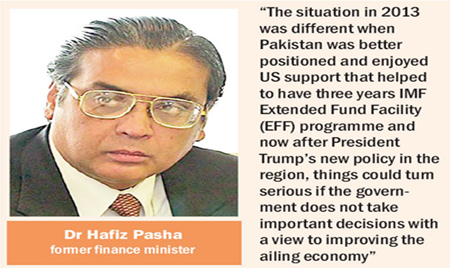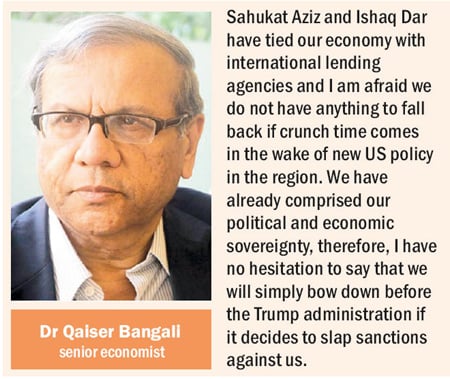The PML (N) government may have to experience growing financial difficulties in case the United States decides to toughen up its stance against Pakistan. That too, most probably at the time of next elections in wakes of US new South Asia and Afghan policy.
In the immediate context, Pakistan is feared to be deprived of $1.7 billion that were to come from US Coalition Support Fund (CSF) in  2107-18. The funds coming through CSF had already been reduced to 40 percent and this is said to be a ‘bigger hole’ that needs to be filled through other external sources.
2107-18. The funds coming through CSF had already been reduced to 40 percent and this is said to be a ‘bigger hole’ that needs to be filled through other external sources.
Besides CSF, which is in fact a reimbursement to Pakistan for its spending on behalf of the United States in the region, Islamabad could be denied roughly $1 to $1.5 billion annual military and economic assistance should there be sanctions applied against the country.
Similarly, officials fear that Pakistan, being the biggest textile exporter to America could lose roughly $3.5 billion annual export market in case of any trade related sanctions. Though China is a major trading partner of Pakistan, USA is the largest importer of Pakistani textile goods and other made ups.
The matter does not end here. Since the United States enjoys majority voting rights in the World Bank and the International Monetary Fund (IMF), it can always influence resulting in new conditions to offer any lending to Pakistan. International Bank for Reconstruction and Development (IBRD), an important lending arm of the World Bank has already believed to have expressed its concern over declining foreign exchange reserves and sited its lending rules according to which reserves must be available for five weeks of mandatory export to qualify for its assistance.
Pakistan is already becoming ineligible for IBRD assistance and the issue would turn challenging when Islamabad goes to IMF for any bailout program. And once the US drives for sanctions, it would reportedly be asking the IMF to link its assistance with 20 percent devaluation of rupee, stretching the current 16 percent sales tax to 20 percent and increasing electricity and gas tariffs.
IMF, it is said, when gets go-ahead from the United States, would also start objecting on generous sovereign guarantees being offered to China Pakistan Economic Corridor (CPEC) projects. Officials in this behalf could be taken to task for extending these sovereign guarantees to Chinese investors when there is no adequate foreign exchange reserves’ cover available to Pakistan.
Likewise the IMF officials could raise objections over the slow pace of implementation on CPEC projects. Since the US government is wary of CPEC project, it could punish Pakistan through IMF and other international lending agencies.
When the going gets tough, the Trump administration could also use its influence in the European Union (EU) to introduce retaliatory economic measures against Pakistan. Islamabad was earlier given over $1 billion additional market access immediately after the current government took over.
Those who are in the know of things also warn that $6-7 billion portfolio investment made in the stock market over the years could also be withdrawn at the behest of the USA whose line would be further towed by IMF and other lenders including international banks and investment companies. This would influence emerging market index that cannot afford to be destroyed.
The crux of the matter is that when reserves are further down, current account continues to widen, exports do not increase and trade deficit would further go beyond the current $52 billion, IMF’s assistance would be linked to serious conditions..
The country’s financial difficulties would exacerbate as $20 billion rescheduling offered by Paris Club during Musharraf’s government has ended in 2016-17 due to which pressure on repayments has sharply increased.
What had transpired between Prime Minister Shahid Khaqan Abbasi and Saudi Crown Prince last week in the Kingdom is anybody’s guess. But the word has it that he sought Saudi political, diplomatic and economic support. However, it is said that Saudi Arabia which offered $1.5 billion cash gift to Pakistan back on 2013 is constrained to oblige due to its increasing fiscal deficit being faced due to prolonged plunge in international oil prices. There was no joint communiqué issued at the end of the meeting which shows that no commitment was made, if any, to help the economy.
“The situation in 2013 was different when Pakistan was better positioned and enjoyed US support that helped to have three years IMF Extended Fund Facility (EFF) programme and now after President Trump’s new policy in the region, things could turn serious if the government does not take important decisions with a view to improving the ailing economy,” said the renowned economist and former finance minister Dr Hafiz Pasha.
 He said the failure to set the house in order is causing problems that required taking emergency measures on sustained basis to put the economy back on track. “I am very concerned over fast declining reserves. Only in July $2 billion reserves have depleted while net borrowing remained just $30 million,” Dr Pasha said adding that decline in gross inflows have made repayments difficult which must be taken into account by the officials of the ministry of finance and the central bank.
He said the failure to set the house in order is causing problems that required taking emergency measures on sustained basis to put the economy back on track. “I am very concerned over fast declining reserves. Only in July $2 billion reserves have depleted while net borrowing remained just $30 million,” Dr Pasha said adding that decline in gross inflows have made repayments difficult which must be taken into account by the officials of the ministry of finance and the central bank.
Dr Pasha regretted that in the absence of working out and implementing home grown prudent economic policies, everything was getting out of control be it fiscal deficit, trade deficit, reserves, current account deficit and even home remittances that have shown for the first time in many years $1 billion reduction. “It is time to deliberate and take action and not just talk,” he said.
Another distinguished economist Dr Qaiser Bangali is not optimistic about the emerging scenario in the region and said the Trump administration could easily paralyse economic and financial system simply by asking the international multilateral agencies and global banks to put conditions for providing support to Pakistan.
“Sahukat Aziz and Ishaq Dar have tied our economy with international lending agencies and I am afraid we do not have anything to fall back if crunch time comes in the wake of new US policy in the region,” he said.
“We have already comprised our political and economic sovereignty, therefore, I have no hesitation to say that we will simply bow down before the Trump administration if it decides to slap sanctions against us,” Dr Bangali said.
He was of the view that there was no short term strategy to deal with the issue as the country’s elite was unprepared to make any sacrifice to help pull out of the current economic mess. “We do not enjoy independence to take autonomous decisions, therefore, I am not sure how to get away with the new situation being created by the Americans.”
There is another argument that Pakistan has always been dependent on USA both in terms of military and economic assistance, hence has very little to cope with the increasing threats of sanctions. Like previous US presidents, Donald Trump has also asked for ‘do more’ in response of which is being suggested to the government to say ‘no more’.
Under these testing times, China is providing all the necessary support to Pakistan the biggest proof of which is the immediate reaction by its foreign ministry that hailed Islamabad’s incredible sacrifices made to fight the menace of terrorism.
Since China is growing unchallenged in the region and withdrawing of non-Nato status from Pakistan by the US would further make Islamabad closer to Beijing which is already multiplying its military cooperation between the two time tested friends.
Some maintain that the US president’s new policy in South Asia and Afghanistan is not really new one and just a loud posturing to force Pakistan to come to terms by denying any so-called safe havens to Taliban and Haqqani network. Why would they need sanctuaries in Pakistan when they control more than 50 percent of Afghan territory?
It is in that backdrop it is being said that these new US measures would remain counterproductive as without Pakistan they cannot win the war in Afghanistan and that they soon would be softening their position especially when they would be sending more troops there as they have no other alternate available to do that. Previous experience of sending arms and other equipment through Central Asia remained very expensive and cumbersome.
 At the end of the day Pakistan will be bailing out the Americans, not India and that that was why couple of articles published including in Washington Post suggested that US could face problems without Islamabad and that no other country is important more than Pakistan when it comes to dealing with war torn Afghanistan.
At the end of the day Pakistan will be bailing out the Americans, not India and that that was why couple of articles published including in Washington Post suggested that US could face problems without Islamabad and that no other country is important more than Pakistan when it comes to dealing with war torn Afghanistan.
The new US policy clearly shows a bigger shift from nation building in Afghanistan to eliminating terrorists and criminals. In his speech Trump ridiculed promoting democracy and nation building in Afghanistan by saying that Afghan government will have to end corruption and set its house in order and that America would no more be that generous. In fact he asked India to spend money there because of having huge trade benefits from USA.
China which is spending $54 billion on CPEC is currently facing difficult time to manage its economy. Last year it provided $4 billion commercial loan and in 2017-18 it plans to offer no more than $2 billion. Officials of the ministry of finance, nonetheless, still hope to be bailed out by the Chinese especially when US places sanctions against Pakistan.
China seems to be a clear winner in Afghanistan as it is facilitating peace there and perusing its strategy with the strong support of Russia, Iran and Pakistan. But whether China can replace USA in terms of a major bilateral creditor and supplier of arms is a question being currently debated in important official and unofficial quarters. But then it is said China has its own economic and financial limitation and a history of not extending any crucial balance of payment support to any country.
Dr Hafiz Pasha
former finance minister
“The situation in 2013 was different when
Pakistan was better
positioned and enjoyed US support that helped to have three years IMF Extended Fund Facility (EFF) programme and now after President Trump’s new policy in the region, things could turn serious if the government does not take
important decisions with a view to improving the ailing economy”
Dr Qaiser Bangali
senior economist
Sahukat Aziz and Ishaq Dar have tied our economy with international lending
agencies and I am afraid we do not have anything to fall back if crunch time comes
in the wake of new US policy in the region. We have
already comprised our
political and economic sovereignty, therefore, I have no hesitation to say that we will simply bow down before the Trump administration if it decides to slap sanctions against us.
The writer is a senior journalist based in Islamabad